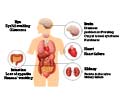Cancer cells can be made dormant by inducing proteins involved in cancer progression to form and remain stored as amyloid bodies within the cell.
Highlights
- Cancer involves new growth formation and spread of cancer cells to distant sites.
- Inducing proteins involved in cancer progression to remain stored as amyloid bodies, renders cancer cells inactive.
- Growth and spread of cancer can be prevented as long as the proteins remain as amyloid bodies.
- This may have potential therapeutic applications in the future.
Molecular Processes Involved in Amyloid Protein Formation
Two processes have been identified within cells, one promoting amyloid protein formation,
and the other causing breakdown of the amyloid protein structure.
"The amyloid state of protein organization is typically associated with debilitating human neuropathies and rarely observed in physiology," said Stephen Lee, Ph.D., director of the Tumor Biology Program at Sylvester, professor of biochemistry and molecular biology at the Miller School, and corresponding author of the study. "Yet, we found that a large number of proteins are stored as amyloid bodies in cancer cells that are dormant. The heat shock chaperone pathway can disaggregate the amyloid bodies and turn the dormant cancer cells into active, progressing cancer cells."
Amyloidogenesis has been shown to help cells remain viable during prolonged periods of extracellular stress, underscoring the protective nature of the process, not just in cancer cells.
Misfolding of proteins disrupts critical cellular processes, leading to a wide range of diseases. One such misfolding is the aggregation of proteins from their soluble forms to insoluble fibrils, taking the form of β-pleated sheets referred to as amyloid. Once formed, these fibrils can virtually not be destroyed. This explains the severe and progressive neurodegenerative effects they produce in Alzheimer’s and Parkinson’s disease.
Intensive research is ongoing to develop treatments targeting amyloidogenesis in various diseases, including cancer.
Scope of the Study Findings
The most important takeaway from this study would be its potential therapeutic application in various forms of cancer.
"Following this approach, we wouldn't necessarily rid the body of cancer cells, but we would keep them inactive - shut off, if you will - and not allow them to become active again," said Lee. "I am optimistic this could become a novel way of treating cancer. There are already drugs on the market, and others are being studied, that target the ribosomal intergenic noncoding RNA as well as the heat shock chaperone pathway."
Source-Medindia















